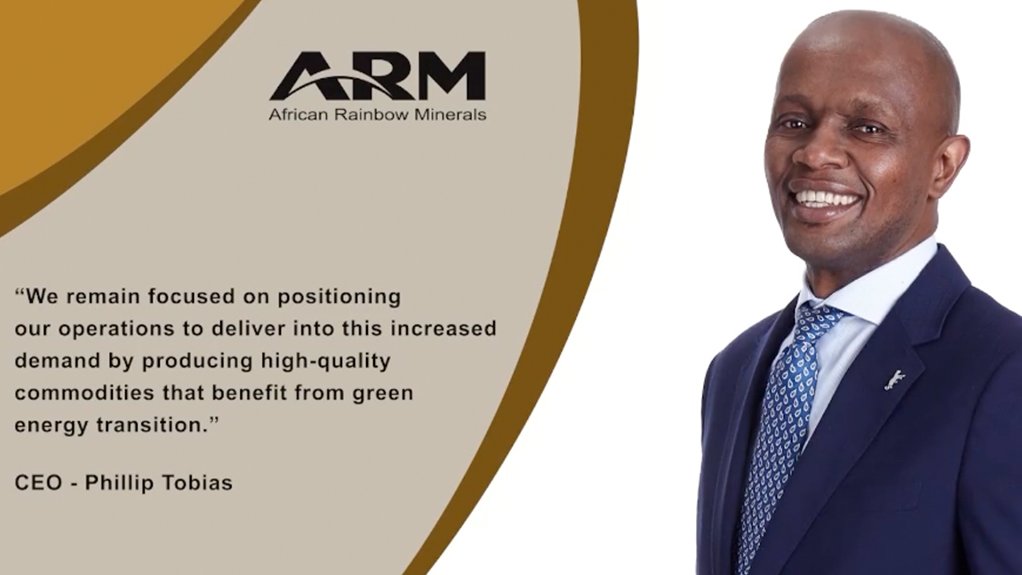JOHANNESBURG (miningweekly.com) – Ensuring cost-competitive operational performance and increasing efficiencies and outputs to improve margins were cited as being key by new African Rainbow Minerals (ARM) CEO Phillip Tobias when he outlined the operating, low price, logistics, power, water and above-inflation cost challenges of ARM’s 2023 financial year to June 30.
“A cost focus is very key,” Tobias emphasised when the Johannesburg Stock Exchange-listed company reported 21% lower headline earnings to R8 981-million on September 4.
“Very important is to continue engagement with Transnet to implement sustainable logistics solutions that are value accretive to all stakeholders,” he said.
The South African diversified company, headed by Dr Patrice Motsepe, which mines iron-ore, manganese ore, chrome ore, platinum group metals (PGMs) and coal, also has a strategic investment in gold through Harmony Gold. ARM’s ferrous metals interests are held through wholly owned ARM Ferrous which owns 50% of Assmang.
Implementation of technology to enhance productivity and efficiencies, looking for appropriate new technology and employing it to deliver better volumes, were highlighted, along with delivering existing growth projects on time and on budget. Applying what went well with the successful R7.4-billion Black Rock project as well as the associated skillsets to projects under way, such as the Two Rivers Merensky project and front-end loading for the Bokoni platinum group metals (PGMs) project, is key. ARM is intent on transitioning Bokoni into execution mode and delivering it on time and on budget.
As an immediate area of attention, improvements are being driven by enhanced levels of mechanisation and automation, and appropriate new technology and fit-for-purpose information technology systems.
“Very important is to control things that are within our control, especially in the PGMs space, and ensuring that we improve our grades close to reserve grade and reduce waste and dilution. It’s an area that’s getting our urgent attention,” said Tobias during the presentation covered by Mining Weekly.
“A lot can be mentioned about where we are positioned following the drop in iron-ore and manganese prices, together with reduced sales volume, especially in the ferrous space.
“If you look at iron-ore, the installed capacity is around 16-million tons and we only delivered 13.2-million tons.
“On the manganese side, Black Rock and Gloria mines have been capacitated to deliver between 4.3-million tons and 4.6-million tons. But the operations have been constrained in this last year by the logistics challenges that we’ve faced, on rail and at port levels.
“Management is continuing to work closely with Transnet to improve the situation and we do believe that we will certainly be able to land at some of the long-term sustainable solutions.
“In terms of the manganese alloys, we’ve experienced the high records that have been delivered by Sakura Ferroalloys.
“On the PGMs side, though there were increased tonnages from Two Rivers and Modikwa, what really challenged us was grade and to that extent, we’re looking at making sure that we optimise mining and reduce waste dilution.
“We have strong Ebitda margins in iron-ore, coal and PGMs, even through there has been a regression in PGMs from a 55% Ebitda margin to 42%. Those three commodities are still delivering on over 40%. However, manganese ore and manganese alloys have been challenged, with manganese ore consistent year-on-year.
“Khumani remains a tier-one iron-ore asset with more than 20 years of life. It has high-grade and low-strip ratios.
“But for the first time, this year we sold less than 12-million tons, a number never seen in the past ten years.
“That really tells you the extent of the challenge that we are facing emanating from the Transnet employee strike that lasted close to ten days, and after those derailments and unavailability of locomotives. Through our engagement, there has been the establishment of the National Logistics Crisis Committee to come up with lasting solutions for the benefit of South Africa Incorporated.
“We need to optimise the rail output and where we can, depending on where the prices are, continue to truck,” Tobias added.
The hydro-powered Sakura Ferroalloys in Malaysia, which achieved record performance, has cut debt by 77% amid high prices at the start of the year, which have since shown sharp decline.
Lower PGMs prices, especially rhodium and palladium prices, are demanding a lower cost structure and improved output.
The building of the R7.2-billion Merensky plant at Two Rivers PGM mine is close to the halfway mark, with commissioning expected in the fourth quarter of 2024 and completion at year-end.
The company is beginning to witness improvement in ore-resource development that is providing the flexibility to improve mining volumes.
The Nkomati nickel mine remains on care and maintenance.
Logistics continue to lower the sales volumes of coal and the same effort to improve the performances of the iron-ore and manganese rail lines is being applied to the under-performing coal line.
Stockpiles have grown as a result of logistics challenges.
Meanwhile, the value of having a diversified portfolio in a volatile market has again been driven home to ARM, which benefitted from coal to a far greater extent than in the past.
EMAIL THIS ARTICLE SAVE THIS ARTICLE ARTICLE ENQUIRY
To subscribe email subscriptions@creamermedia.co.za or click here
To advertise email advertising@creamermedia.co.za or click here











